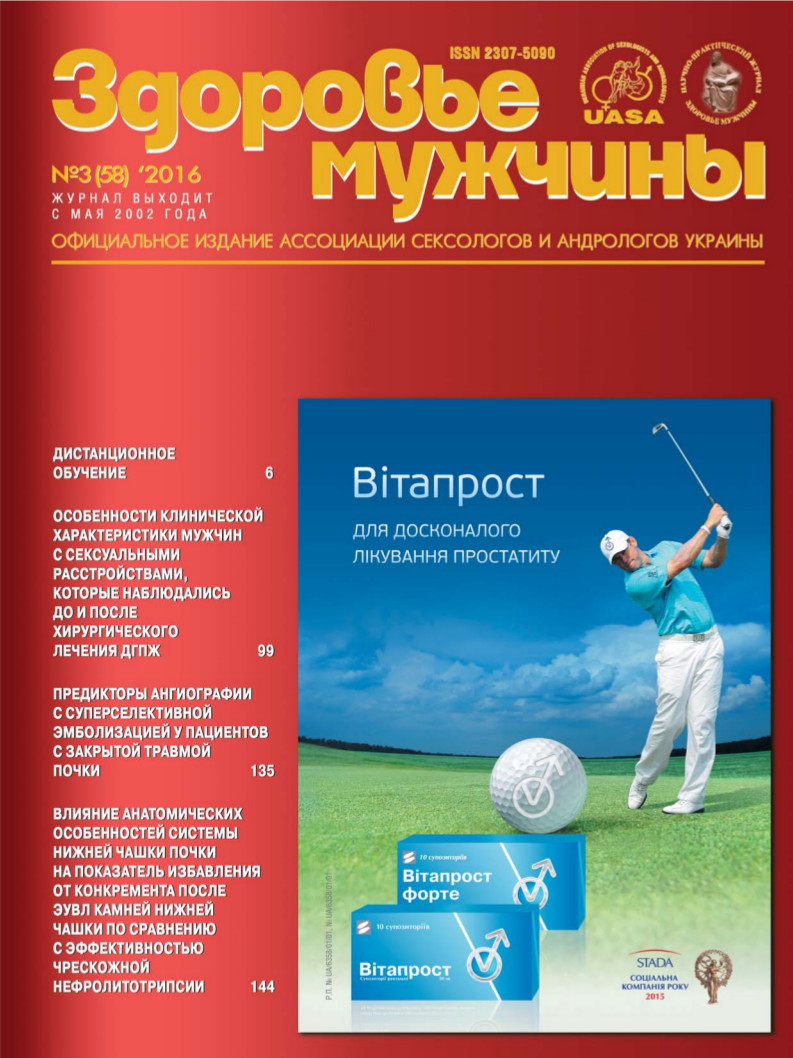Risk factors for renewal of fertility in married couples with male infertility using the assisted reproductive technologies
##plugins.themes.bootstrap3.article.main##
Abstract
Here are the results of studying the risk factors for development of male infertility and their probable influence on the results of renewal of fertility in 180 married couple, caused by the indicated reason. The study was performed at the Institute of Reproductive Medicine (Kyiv). The examination and service through the Program of intracystoplasmic sperm injection (ICSI) were performed according to the actual protocol. The anamnesis method allowed to determine 25 factors and 51 features which disclose their essence. They were parted into three groups by the direction of action: social, biologic/common medical, specifically medical.
There was assessed the connection between the result of the ICSI Program and risk factor (feature) through the index of chance ratio. Following the received data, new potentialities to improve the principles for prophylaxis are opening; and the cause-effect relationship between the factors (features), especially of specifically medical direction, will ensure the personified approach to the selection of method of assisted reproductive technologies.
##plugins.themes.bootstrap3.article.details##

This work is licensed under a Creative Commons Attribution 4.0 International License.
Authors retain the copyright and grant the journal the first publication of original scientific articles under the Creative Commons Attribution 4.0 International License, which allows others to distribute work with acknowledgment of authorship and first publication in this journal.
References
Божедомов В.А. Мужской фактор бездетного брака – пути решения проблемы / В.А. Божедомов // Урология (приложение). – 2016. – No 1. – С. 28–34.
Брагина Е.Е. Руководство по сперматологии / Под ред. Е.Е. Брагиной, Р.А. Абдумаликовой. – М.: Медицина, 2002. – 93 с.
Вишневский А.Г. Демографическая ситуация / А.Г. Вишневский, В.И. Сакевич, Е.М. Щербакова // Здоровье России: Атлас: под ред. Л.А. Бокерия. Изд. 5-е. – М. : НЦССХ им. А.Н. Бакулева РАМН, 2009. – С. 5–30.
Ворник Б.М. Сексуальность и репродуктивность мужчин в Украине : социально-клинические параллели / Б. М. Ворник // Здоровье мужчины. – 2012. – No 3. – С. 64–68.
Горпинченко І.І. Чоловіче безпліддя: етіологія, патогенез, діагностика та лікування / І.І. Горпинченко, М.Г. Романюк // Здоровье мужчины. – 2016. – No 1. – С. 8–17.
Дахно Ф.В. Допоміжні репродуктивні технології лікування безпліддя: Навч. посіб. / За заг. ред. проф. Ф.В. Дахна, чл.-кор. НАМН України, проф. В.В. Камінського, проф. О.М. Юзька. – К.: Здоров’я, 2011. – 338 с.
Запорожан В.М. Патогенетичні основи нових технологій діагностики та лікування патології репродуктивної системи / В.М. Запорожан // Фізіол. журн. – 2008. – No 4. – С. 48.
Колесник Н.А. Теория и практика доказательной медицины / Н.А. Колесник, В.Н. Непомнящий, Е.С. Самусева. – К.: Полиграфплюс, 2006. – 200 с.
Лебедева О.Е. Оптимизация программы вспомогательных репродуктивных технологий у супружеских пар, нуждающихся в проведении интрацитоплазматической инъекции сперматозоида в ооцит, путем применения преимплантационной диагностики: Автореф. дис. ... канд. мед. наук: 14.00.01 – акушерство и гінекологія, 03.02.07 – генетика / О.Е. Лебедева. – М., 2011. – 27 с.
Манушарова Р.А. Бесплодный брак / Р.А. Манушарова // Эффективная фармакология. – 2014. – No 9. – С. 34–39.
Онищук О.Д. Оптимізація підготовки жінок до програм запліднення? Іn vitro після невдалих попередніх / О.Д. Онищук // Буковинський мед. вісник. – 2011. – Т. 15, No 3. – С. 55–57.
Семенюк О.А. Статево-вікові собливості смертності населення працездатного віку та шляхи її попередження: Автореф. ... канд. мед. наук: 14.02.03 – соціальна медицина / О.А. Семенюк. – К., 2015. – 24 с.
Andrology for the Clinician / Edited by W.-B. Schill, F.H. Comhaire, F.B. Hargreave. – Moscow: GEOTAR-Media, 2011, 800 p.
Bocca S. ICSI outcomes in men undergoing TESE for azoospermia and impact of maternal age / S. Bocca, V. Moussavi, V. Brugh, M. Morshedi [et al.] // Andrologia. – 2016. – V. 20 (2). – P. 69–73.
Check J.H. Failed fertilization with conventional oocyte insemination can be overcome with the ability of ICSI according to binding or failing to bind to the zona pellucida / J.H. Check, A. Bollendorf, C. Wilson // Clin. Exp. Obstet Gynecol. – 2016. – V. 43 (2). – P. 186–8.
Davies M.J. Reproductive technologies and the risk of birth defects / M.J. Davies, V.M. Moore, K.J. Willson, P. Van Essen [et al.] // N. Engl. J. Med. – 2012. – V. 366 (19). – P. 1803–13.
European Association of Urology. Guidelines on Male Sexual Dysfunction: Erectile Dysfunction and Premature Ejaculation, 2015. – 21 p.
Gatimel N. Intracytoplasmic morphologically selected sperm injection (IMSI) does not improve outcome in patients with two successive IVF-ICSI failures / N. Gatimel, J. Parinaud, R.D. Leandri // J. Assist. Reprod. Genet. – 2016. – V. 33 (3). – P. 349–55.
Kim H.J. Comparison between intracytoplasmic sperm injection and intracytoplasmic morphologically selected sperm injection in oligo-astheno-teratozoospermia patients / H.J. Kim,
H.J. Yoon, J.M. Jang, H.S. Oh [et al.] // Clin. Exp. Reprod. Med. – 2014. – V. 41 (1). – P. 9–14.





